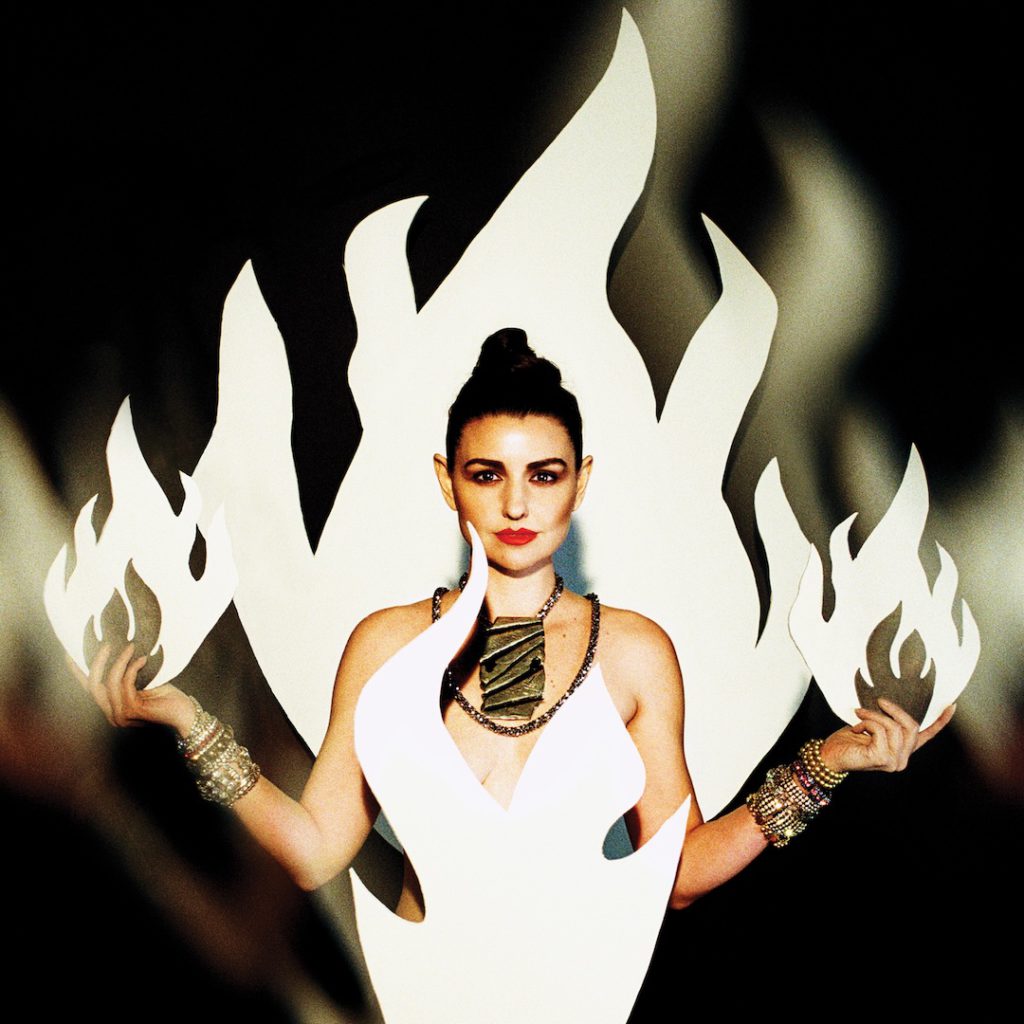
I’ve been hooked on Triple Fire, the latest album from Geneva Jacuzzi, since a promo turned up in my email a while back. As the August 23 release date approached, I listened to the album more often, trying to dig deeper into the stories within songs like “Laps of Luxury,” “Art Is Dangerous” and “Scene Ballerina” that are so vivid, yet so open to interpretation. The music, the lyrics, it all felt like it was already a part of Los Angeles.
Jacuzzi has been making music in L.A. since the ‘00s and first came to underground attention with the band Bubonic Plague, who were amazing live, btw. Triple Fire is her third solo album since 2010 and her first full-length for Dais Records.
Jacuzzi’s music, past and present, exists in this L.A. space where where subcultures convene and people continually push to make art, even as that becomes an increasingly more difficult thing to do in the city. Like a lot of local DIY musicians, Jacuzzi has straddled the indie club and art worlds, which you can see in the videos for “Art Is Dangerous” and “Scene Ballerina,” as both feature plenty of cameo appearances from local musicians and artists. You can hear it in the songs too, particularly “Art Is Dangerous,” a mutant disco-style jam that feels like it’s speaking about the precarious nature of art. In a timeline where so many people view art as mere content that’s designed to be likable, “Art Is Dangerous” is a powerful statement.
Back in 2016, I interviewed Jacuzzi for L.A. Weekly. The story has altogether disappeared from the web, but I was able to dig out the rough draft from one of my old hard drives to reference here. That article centered around a show at HM157 in Lincoln Heights, which happened sometime near the release of Technophelia. It was a wild night, with inflatable tentacles floating through a crowd packed into a show space that was actually the living room of an old L.A. mansion. It was difficult, sometimes near-impossible, to see what was happening on stage, but that didn’t really matter. The barrier between the performance and the audience had almost vanished. “If they can’t see the show, they can’t see the show,” Jacuzzi said in that interview. “They can see what’s happening to the other people who are seeing the show. The show can bleed out in its own way.”
(Update: Someone with better Wayback search skills than mine found the L.A. Weekly story! Click to read, “At a Geneva Jacuzzi Show, You Might Get Smothered By a Giant Tentacle”)
What I really appreciated about that interview, and, really, Jacuzzi’s work, is that the performance isn’t just what you see on stage. It’s about a full scenario, which includes everything that the audience adds to the show. Similarly, there’s an argument to be made that music isn’t just about the songs as they are presented on a release, but also how they travel through the world, what kind of responses they trigger and how they settle into the lives of listeners.
When I listen to Triple Fire, I hear two things. One is the L.A. of the imagination, the city that inspires so many fantastic tales. “Laps of Luxury” is my personal favorite on the album. With a sound that echoes the freestyle jams of the ‘80s, Jacuzzi plays a character chatting up a driver as she tries to “get away before the sunrise.” She sings, “Tragic mysteries I’ve known for centuries.” I think of vampires cruising along Sunset to or from Countess’ mansion in Once Bitten. Had this song come out forty years ago, it would have slayed in that movie.
I hear the imagined in L.A. more in the music, than the lyrics, though. Throughout Triple Fire, there are songs that sound as if they were made for ‘80s films that don’t exist. There’s a montage somewhere that could use “Take It or Leave It” and a club or school dance scene that needs the DJ to drop “Bow Tie Eater.” Sometimes, it’s very brief moments in songs that trigger these movies that now exist only in my head, like the sax in “Heart Full of Poison” or the opening of “Rock and a Heart Place” with its very ’80s Roxy Music vibe.
But then there’s the real, hard L.A. that comes through in lyrics like “I’ve seen so many things that no one should ever see/On the laps of luxury” (“Laps of Luxury”) and “Who gave you the right to talk to me?/Who gave you the right to hang it on the wall?” (“Art Is Dangerous”). And, trust me, if you’ve ever worked in L.A. nightlife, you know more than one “Scene Ballerina.” All this leads to a tug-of-war between the beauty of imagination and the reality of a place where it is very difficult to carve out an artist’s life. That tension makes Triple Fire such a compelling album.
Liz O. is an L.A.-based writer and DJ. Read her recently published work and check out her upcoming gigs.
Keep Reading:
NEYVA LIVE AT “YOURS, FOREVER” EXHIBITION AT LEIMINSPACE
I SWIPED THIS REAL LIFE SONG FROM VOYAGE OF THE ROCK ALIENS
